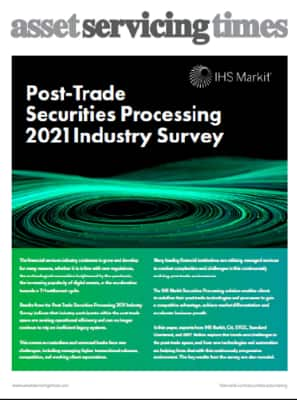Featured Topics
Featured Products
Events
S&P Global Offerings
Featured Topics
Featured Products
Events
S&P Global Offerings
Featured Topics
Featured Products
Events
S&P Global Offerings
Featured Topics
Featured Products
Events
Financial and Market intelligence
Fundamental & Alternative Datasets
Government & Defense
Professional Services
Banking & Capital Markets
Economy & Finance
Energy Transition & Sustainability
Technology & Innovation
Podcasts & Newsletters
Financial and Market intelligence
Fundamental & Alternative Datasets
Government & Defense
Professional Services
Banking & Capital Markets
Economy & Finance
Energy Transition & Sustainability
Technology & Innovation
Podcasts & Newsletters
BLOG — Jun 22, 2022
Though there are many hyped technologies within the post-trade arena at the moment, the humble application programming interface (API) is top of most firms' wish lists, according to a recent survey of operations teams. The majority of respondents to IHS Markit's recent survey indicated that APIs are first (36% of respondents) or second (also 36%) in their technology priority lists to support clients' current and future requirements. Bottom of the list, for now, is artificial intelligence (AI) with only 5% of firms placing it first on their list, likely because of its nascent adoption and early-stage application in this space.
The benefits of open APIs are clear to many firms within the securities space and that's why so many firms have launched API programmes and developed strategies to increase client and counterparty access to key data sets and services. Firms are also keen to see their vendors extend their API capabilities to enable more seamless connectivity between data providers, market infrastructures, solution and services providers and new fintech firms. Financial institutions are working with a much greater number of fintechs in areas such as environmental, social and governance (ESG) data analytics and cryptocurrency investment to support their own client demands.
There's no doubt that large financial institutions, especially those on the sell-side, have commonly been builders of post-trade technology platforms in the past, but firms are also increasingly turning to vendor partners to allow them to keep pace with industry and regulatory changes. Smaller and midsize firms in particular simply cannot keep up with the pace of regulatory and post-trade market structure change across the globe. Given the industry focus on reducing the settlement cycle in the US and the European focus on penalising settlement failures via the Central Securities Depositories Regulation (CSDR), these pressures are only likely to increase over time.
Moreover, the industry may have adapted well to the work from anywhere mandate, but ongoing compliance and governance considerations mean supporting increased operational oversight and lifecycle visibility is of paramount importance to financial institutions of all sizes. The survey indicates that visibility for monitoring and control in a remote environment is one of the most important factors from the COVID-19 pandemic that has pushed technology transformation up their firms' investment agenda. Just under a third of respondents placed it as their number one influencing factor and just over a third said it was their number two influencing factor. The regulatory focus on increasing operational resilience also plays into this dynamic and increases the need for firms to automate previously manual tasks and prove they have the systems and controls in place to mitigate operational risk.
Unsurprisingly, cloud is also a priority for many firms and the survey highlights that the pandemic has increased the focus on this move, with half of respondents indicating it is their first or second priority. Cloud-first strategies have come to the fore for many firms as they seek to increase their scalability to cope with market volatility and higher data storage requirements stemming from client and regulatory pressures. The move to a cloud-hosted environment is much easier when working with a tried and tested platform provider that has the requisite team members well-versed in building cloud native technology rather than attempting to go it alone. Vendor offerings have also matured significantly over time, as more and more clients have fed back their requirements into the development of managed services, for example. Download survey findings today!
Download survey findings today!
Posted 22 June 2022 by Bill Meenaghan, Director, Product Management, IMSecurities, S&P Global Market Intelligence
S&P Global provides industry-leading data, software and technology platforms and managed services to tackle some of the most difficult challenges in financial markets. We help our customers better understand complicated markets, reduce risk, operate more efficiently and comply with financial regulation.
This article was published by S&P Global Market Intelligence and not by S&P Global Ratings, which is a separately managed division of S&P Global.
